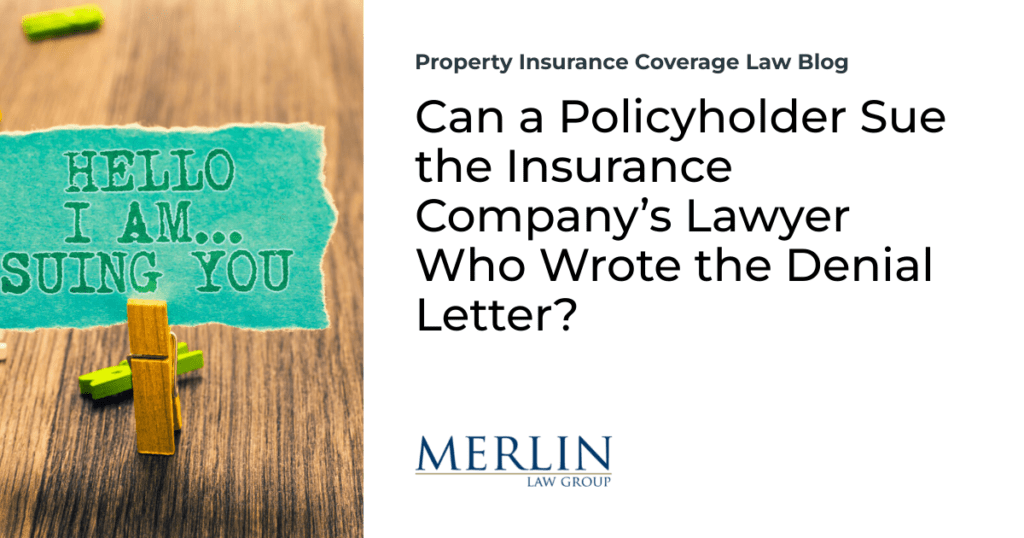Can a Policyholder Sue the Insurance Company’s Lawyer Who Wrote the Denial Letter?

Some insurance companies seem to foster a troubling culture by employing legal counsel who approach their roles with arrogance and condescension, often to the detriment of the very policyholders insurers have a good faith obligation to serve. In my early years of practice, I briefly served as an external legal counsel for insurance companies, which I noted in Butler Pappas–A Familiar Foe. I distinctly recall that during this period, State Farm explicitly instructed its external lawyers not to mistreat its customers. This directive is a testament to the leadership of State Farm at that time, ensuring that both its internal staff and external partners treated customers, especially those with disputes, with the utmost respect.
However, the landscape appears to have shifted in recent times. Many insurance companies and their legal representatives now seem to act aggressively, almost like “mad dogs on a leash.” While this is especially true in their private interactions, many on social media are doing the same thing and acting as puppets for insurance company lobbyists rather than limit their practice to legal representation of specific claims. They publicly call for the reduction of policyholder rights to win employment and grow their firms from insurers wishing to escape accountability for honest and good faith treatment. The respect and courtesy once extended to claimants seem to be dwindling. The times and insurance company corporate cultures have indeed evolved, and not always for the better.
Accordingly, some policyholders often ask if they can sue the insurance company attorneys for their involvement when denying insurance claims. This was an issue partly addressed in a Colorado decision last week.1 Here are the relevant facts:
Plaintiff, a Colorado citizen, insured a building and business property in Louisville, Colorado, under a policy issued by Owners. In June 2018, a hail and windstorm caused significant damage to the property, and Plaintiff submitted a claim. When the parties could not agree on the value of the claim, Plaintiff and Owners selected appraisers pursuant to the policy. The appraisers agreed on Chris Weis as the umpire, and he signed an appraisal award for actual and replacement cost values totaling nearly a million dollars.
In May 2020, Plaintiff received a check from Owners along with a letter from Giometti, counsel for Owners, stating its position that Mr. Weis was not qualified to act as an umpire and therefore the appraisal award was invalid. The letter explains that after receiving the appraisal award, Owners learned that Mr. Weis ‘pled guilty to, and at the time he served as the umpire was under probation for, committing a class 5 felony for theft pursuant to C.R.S. § 18-4-401 arising out of his service as a roofing contractor to repair hailstorm damage in Larimer County.’ The letter states that Owners also learned ‘Weis also pled guilty to committing a class 5 felony for theft in Denver County.’ (Id. at 4.) And the letter states that Mr. Weis failed to disclose the felonies, as required, raising ‘questions and concerns pertaining to [his] competence to serve as an umpire.’
After agreeing to vacate the appraisal award, Plaintiff filed suit in state court against Owners, a Michigan corporation, and Giometti, a Colorado [lawyer.] Plaintiff asserts claims for breach of contract, bad faith, and unreasonable delay against Owners as well as a claim for negligent misrepresentation against Giometti.
The excellent brief of the attorneys defending the insurance defense attorney noted:
The only ‘reasonable inference’ that can be drawn from the allegations in the Complaint is that Giometti’s letter was not issued for the benefit of Plaintiff or to induce a mutually beneficial business relationship; rather, it was sent in an adversarial context in anticipation of litigation. Thus, even when Plaintiff’s allegations are viewed in a light most favorable to Plaintiff, Giometti cannot be liable for negligent misrepresentation.
The court agreed—an insurance company lawyer cannot be sued for simply transmitting the reasons for the denial of a claim.
Insurance defense attorneys play a pivotal role in our society. It’s essential to understand that insurance companies are not obligated to pay claims that aren’t covered or those that are fraudulent. Merely stating these facts in writing to a policyholder doesn’t open the door for the insurance company’s attorney to be sued.
However, the situation can change when the facts and findings suggest potential wrongdoing. For instance, as I discussed in my article, Attorney Professionalism, Honest Candor, and the Battering of Sandy Flood Policyholders, there are circumstances where the actions of legal professionals might be called into question:
Sometimes, I wonder if some insurance defense counsel live in an alternative world where whatever goes is appropriate so long as their client does not get caught cheating policyholders. This is not the first major catastrophe where altered reports of damage or cause of damage have been exposed through litigation and press.
The answer to today’s title question is generally: “No, the insurance company attorney cannot be sued.” But……
Thought For The Day
Discourage litigation. Persuade your neighbors to compromise whenever you can. As a peacemaker the lawyer has superior opportunity of being a good man. There will still be business enough.
—Abraham Lincoln
1 Thornton Hamilton v. Owners Ins. Co., No. 22-cv-0292 (D. Colo. Sept. 13, 2023).



